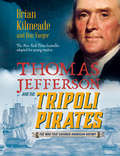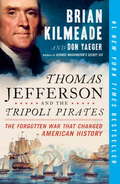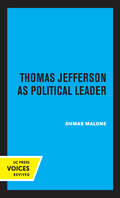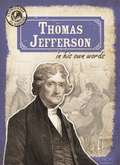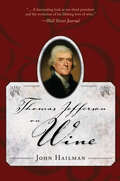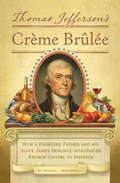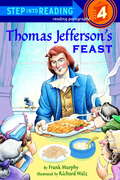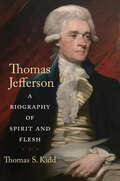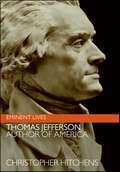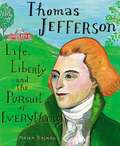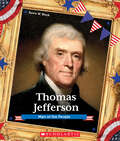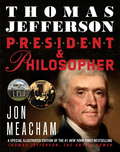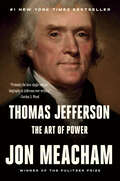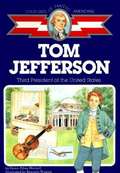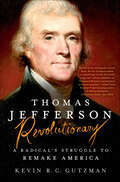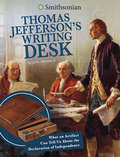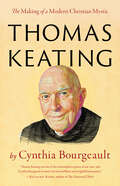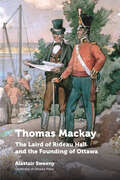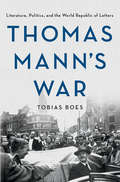- Table View
- List View
Thomas Jefferson and the Tripoli Pirates (Young Readers Adaptation)
by Brian Kilmeade Don YaegerA page-turning middle-grade adaptation of the New York Times bestseller about how a newly independent nation was challenged by foreign powers and what happened when America's third president decided to stand up to intimidation.When Thomas Jefferson became president in 1801, America was deeply in debt and needed its economy to grow quickly, but its merchant ships were under attack. Pirates from North Africa routinely captured American sailors and held them as captives demanding ransom and tribute far beyond what the new country could afford.Jefferson found it impossible to negotiate a truce, and decided to move beyond diplomacy. He sent the U.S. Navy and Marines to blockade Tripoli--launching the Barbary Wars and beginning America's journey toward future superpower status.This vivid and accessible young readers adaptation of the New York Times bestseller features an exclusive new introduction, extensive back matter, and eye-catching art throughout. Chronicling a crucial moment in American history, this historical thriller will excite and inspire the next generation of patriots.
Thomas Jefferson and the Tripoli Pirates: The Forgotten War That Changed American History
by Brian Kilmeade Don Yaeger"Another blockbuster! Thomas Jefferson and the Tripoli Pirates reads like an edge-of-your-seat, page-turning thriller. You will love this book and also wonder why so few people know this story. No one captures the danger, intrigue, and drama of the American Revolution and its aftermath like Brian Kilmeade and Don Yaeger." --Brad ThorThis is the little-known story of how a newly independent nation was challenged by four Muslim powers and what happened when America's third president decided to stand up to intimidation. When Thomas Jefferson became president in 1801, America faced a crisis. The new nation was deeply in debt and needed its economy to grow quickly, but its merchant ships were under attack. Pirates from North Africa's Barbary coast routinely captured American sailors and held them as slaves, demanding ransom and tribute payments far beyond what the new country could afford. Over the previous fifteen years, as a diplomat and then as secretary of state, Jefferson had tried to work with the Barbary states (Tripoli, Tunis, Algiers, and Morocco). Unfortunately, he found it impossible to negotiate with people who believed their religion justified the plunder and enslavement of non-Muslims. These rogue states would show no mercy--at least not while easy money could be made by extorting the Western powers. So President Jefferson decided to move beyond diplomacy. He sent the U.S. Navy's new warships and a detachment of Marines to blockade Tripoli--launching the Barbary Wars and beginning America's journey toward future superpower status. As they did in their previous bestseller, George Washington's Secret Six, Kilmeade and Yaeger have transformed a nearly forgotten slice of history into a dramatic story that will keep you turning the pages to find out what happens next. Among the many suspenseful episodes: ·Lieutenant Andrew Sterett's ferocious cannon battle on the high seas against the treacherous pirate ship Tripoli. ·Lieutenant Stephen Decatur's daring night raid of an enemy harbor, with the aim of destroying an American ship that had fallen into the pirates' hands.·General William Eaton's unprecedented five-hundred-mile land march from Egypt to the port of Derne, where the Marines launched a surprise attack and an American flag was raised in victory on foreign soil for the first time. Few today remember these men and other heroes who inspired the Marine Corps hymn: "From the Halls of Montezuma to the Shores of Tripoli, we fight our country's battles in the air, on land and sea." Thomas Jefferson and the Tripoli Pirates recaptures this forgotten war that changed American history with a real-life drama of intrigue, bravery, and battle on the high seas.
Thomas Jefferson and the Tripoli Pirates: The Forgotten War That Changed American History
by Brian Kilmeade Don Yaeger"Another blockbuster! Thomas Jefferson and the Tripoli Pirates reads like an edge-of-your-seat, page-turning thriller. You will love this book and also wonder why so few people know this story. No one captures the danger, intrigue, and drama of the American Revolution and its aftermath like Brian Kilmeade and Don Yaeger." --Brad ThorThis is the little-known story of how a newly independent nation was challenged by four Muslim powers and what happened when America's third president decided to stand up to intimidation. When Thomas Jefferson became president in 1801, America faced a crisis. The new nation was deeply in debt and needed its economy to grow quickly, but its merchant ships were under attack. Pirates from North Africa's Barbary coast routinely captured American sailors and held them as slaves, demanding ransom and tribute payments far beyond what the new country could afford. Over the previous fifteen years, as a diplomat and then as secretary of state, Jefferson had tried to work with the Barbary states (Tripoli, Tunis, Algiers, and Morocco). Unfortunately, he found it impossible to negotiate with people who believed their religion justified the plunder and enslavement of non-Muslims. These rogue states would show no mercy--at least not while easy money could be made by extorting the Western powers. So President Jefferson decided to move beyond diplomacy. He sent the U.S. Navy's new warships and a detachment of Marines to blockade Tripoli--launching the Barbary Wars and beginning America's journey toward future superpower status. As they did in their previous bestseller, George Washington's Secret Six, Kilmeade and Yaeger have transformed a nearly forgotten slice of history into a dramatic story that will keep you turning the pages to find out what happens next. Among the many suspenseful episodes: ·Lieutenant Andrew Sterett's ferocious cannon battle on the high seas against the treacherous pirate ship Tripoli. ·Lieutenant Stephen Decatur's daring night raid of an enemy harbor, with the aim of destroying an American ship that had fallen into the pirates' hands.·General William Eaton's unprecedented five-hundred-mile land march from Egypt to the port of Derne, where the Marines launched a surprise attack and an American flag was raised in victory on foreign soil for the first time. Few today remember these men and other heroes who inspired the Marine Corps hymn: "From the Halls of Montezuma to the Shores of Tripoli, we fight our country's battles in the air, on land and sea." Thomas Jefferson and the Tripoli Pirates recaptures this forgotten war that changed American history with a real-life drama of intrigue, bravery, and battle on the high seas.
Thomas Jefferson as Political Leader (Jefferson Memorial Lectures)
by Dumas MaloneThis title is part of UC Press's Voices Revived program, which commemorates University of California Press’s mission to seek out and cultivate the brightest minds and give them voice, reach, and impact. Drawing on a backlist dating to 1893, Voices Revived makes high-quality, peer-reviewed scholarship accessible once again using print-on-demand technology. This title was originally published in 1963.
Thomas Jefferson for Kids: His Life and Times with 21 Activities
by Brandon Marie MillerDrawing heavily from the original letters and papers of Thomas Jefferson and his contemporaries, this resource chronicles the world of the Founding Father who wrote the Declaration of Independence. From his early critiques of the colonial policies of Great Britain and King George III to his governmental roles as the first secretary of state, the minister to France, and the third president of the United States, Jefferson's groundbreaking achievements are described in historical context. The contradictions in Jefferson's character--most notably the fact that he owned 600 slaves in his lifetime despite penning the immortal phrase "all men are created equal"--are also explored, giving kids a full picture of this skilled politician. Creative activities that invite children to experience Jefferson's colonial America include designing a Palladian window, building a simple microscope, painting a "buffalo robe," and dancing a reel.
Thomas Jefferson in His Own Words
by John M. SheaThomas Jefferson's career is an incredible list of accomplishments. Not just the primary author of the Declaration of Independence and the third US president, he's also the founder of the University of Virginia and the architect of Monticello. This in-depth biography of Jefferson uses his documents and private letters as primary sources to paint a complete portrait of the man and his undeniable impact on a new nation. Historical images, sidebars, and "More to Know" fact boxes add to the appeal of this absorbing book.
Thomas Jefferson on Wine
by John HailmanIn Thomas Jefferson on Wine, John Hailman celebrates a founding father's lifelong interest in wine and provides unprecedented insight into Jefferson's character from this unique perspective. In both his personal and public lives, Jefferson wielded his considerable expertise to influence the drinking habits of his friends, other founding fathers, and the American public away from hard liquor toward the healthier pleasures of wine. An international wine judge and nationally syndicated wine columnist, Hailman discusses how Jefferson's tastes developed, which wines and foods he preferred at different stages of his life, and how Jefferson became the greatest wine expert of the early American republic. Hailman explores the third president's fascination with scores of wines from his student days at Williamsburg to his lengthy retirement years at Monticello, using mainly Jefferson's own words from hundreds of immensely readable and surprisingly modern letters on the subject. Hailman examines Jefferson's five critical years in Paris, where he learned about fine wines at Europe's salons and dinner tables as American Ambassador. The book uses excerpts from Jefferson's colorful travel journals of his visits to France, Italy, and Germany, as well as his letters to friends and wine merchants, some of whose descendants still produce the wines Jefferson enjoyed. Vivid contemporaneous accounts of dinners at the White House allow readers to experience vicariously Jefferson's "Champagne diplomacy." The book concludes with an overview of the current restoration of the vineyards at Monticello and the new Monticello Wine Trail and its numerous world-class Virginia wineries. In Thomas Jefferson on Wine, Hailman presents an absorbing and unique view of this towering historical figure.
Thomas Jefferson's Creme Brulee: How a Founding Father and His Slave James Hemings Introduced French Cuisine to America
by Thomas J. CraughwellThis culinary biography recounts the 1784 deal that Thomas Jefferson struck with his slaves, James Hemings. The founding father was traveling to Paris and wanted to bring James along "for a particular purpose"-- to master the art of French cooking. In exchange for James's cooperation, Jefferson would grant his freedom. Thus began one of the strangest partnerships in United States history. As Hemings apprenticed under master French chefs, Jefferson studied the cultivation of French crops (especially grapes for winemaking) so the might be replicated in American agriculture. The two men returned home with such marvels as pasta, French fries, Champagne, macaroni and cheese, crème brûlée, and a host of other treats. This narrative history tells the story of their remarkable adventure--and even includes a few of their favorite recipes!
Thomas Jefferson's Ethics and the Politics of Human Progress
by Ari HeloCould Jefferson claim any consistency in his advocacy of democracy and the rights of man while remaining one of the largest slaveholders in Virginia? This extensive study of Jefferson's intellectual outlook suggests that, once we fully acknowledge the premises of his ethical thought and his now outdated scientific views, he could. Jefferson famously thought the human mind to be 'susceptible of much improvement … most of all, in matters of government and religion'. Ari Helo's thorough analysis of Jefferson's understanding of Christian morality, atheism, contemporary theories of moral sentiments, ancient virtue ethics, natural rights, and the principles of justice and benevolence suggests that Jefferson refused to be a philosopher, and did so for moral reasons. This book finds Jefferson profoundly political in his understanding of individual moral responsibility and human progress.
Thomas Jefferson's Feast (Step into Reading)
by Richard Walz Frank MurphyDid you know that every time you munch on a french fry or snack on ice cream, you have Thomas Jefferson to thank? It's true! This founding father was one of America's first foodies. After a visit to France, he introduced all sorts of yummy treats to America--including one that upset more than just tummies and created a culinary controversy! Get the scoop in this deliciously funny, true story--guaranteed to tempt even the most reluctant readers!
Thomas Jefferson: 3rd President of the United States
by Rebecca StefoffTraces the life of the Virginia politician, American diplomat, and United States president and examines the domestic and foreign issues dominating his career.
Thomas Jefferson: A Biography of Spirit and Flesh
by Thomas S. KiddA revelatory new biography of Thomas Jefferson, focusing on his ethical and spiritual life “Set aside everything you think you know about Thomas Jefferson and religion, and read this book. This is the definitive account. It is well written, well researched, judicious, and entirely convincing.”—Timothy Larsen, Wheaton College Thomas Jefferson was arguably the most brilliant and inspiring political writer in American history. But the ethical realities of his personal life and political career did not live up to his soaring rhetoric. Indeed, three tensions defined Jefferson’s moral life: democracy versus slavery, republican virtue versus dissolute consumption, and veneration for Jesus versus skepticism about Christianity. In this book Thomas S. Kidd tells the story of Jefferson’s ethical life through the lens of these tensions, including an unapologetic focus on the issue where Jefferson’s idealistic philosophy and lived reality clashed most obviously: his sexual relationship with his enslaved woman Sally Hemings. In doing so, he offers a unique perspective on one of American history’s most studied figures.
Thomas Jefferson: An Intimate History
by Fawn M. BrodieA bibliography of one of our most interesting Presidents, Thomas Jefferson.
Thomas Jefferson: Author of America (Eminent Lives)
by Christopher Hitchens"A balanced, readable portrait. A refreshing perspective.” —New York Times Book ReviewWith intelligence, insight, eloquence, and wit, bestselling author Christopher Hitchens gives us an artful portrait of a complex, formative figure in American history and his turbulent era.In this unique biography of Thomas Jefferson, leading journalist and social critic Christopher Hitchens offers a startlingly new and provocative interpretation of our Founding Father—a man conflicted by power who wrote the Declaration of Independence and acted as ambassador to France yet yearned for a quieter career in the Virginia legislature. A masterly writer, Jefferson was an awkward public speaker. A professed proponent of emancipation, he elided the issue of slavery from the Declaration of Independence and continued to own human property. A reluctant candidate, he left an indelible presidential legacy.
Thomas Jefferson: Life, Liberty and the Pursuit of Everything
by Maira KalmanRenowned artist Maira Kalman sheds light on the fascinating life and interests of the Renaissance man who was our third president.Thomas Jefferson is perhaps best known for writing the Declaration of Independence—but there’s so much more to discover. This energetic man was interested in everything. He played violin, spoke seven languages and was a scientist, naturalist, botanist, mathematician and architect. He designed his magnificent home, Monticello, which is full of objects he collected from around the world. Our first foodie, he grew over fifteen kinds of peas and advocated a mostly vegetarian diet. And oh yes, as our third president, he doubled the size of the United States and sent Lewis and Clark to explore it. He also started the Library of Congress and said, “I cannot live without books.” But monumental figures can have monumental flaws, and Jefferson was no exception. Although he called slavery an “abomination,” he owned about 150 slaves.As she did in Looking at Lincoln, Maira Kalman shares a president’s remarkable, complicated life with young readers, making history come alive with her captivating text and stunning illustrations.
Thomas Jefferson: Man of the People (Presidential Biographies)
by Sonia BlackMeet Thomas Jefferson, our third president-and one of the most famous of America's Founding Fathers. Jefferson was the author of the Declaration of Independence. During his time in office, he tried to maintain the ideals he had outlined in that document. He supported scientific exploration and worked to give Americans religious freedom and access to education. He will always be remembered.This series of engaging, in-depth books introduces readers to the men who have led our country since its very first days. Lively text and colorful illustrations are supplemented by fun facts, a timeline, and even a sampling of the subject's most famous quotes.Presidential Biographies will be the first books kids reach for when writing a report-or if they're simply looking for a fascinating read!
Thomas Jefferson: President and Philosopher
by Jon MeachamIn this special illustrated edition of the #1 New York Times bestselling Thomas Jefferson: The Art of Power by Pulitzer Prize-winning author Jon Meacham, young readers will learn about the life and political philosophy of one of our Founding Fathers. Thomas Jefferson was the third president of the United States. He was one of the authors of the Declaration of Independence. But he was also a lawyer and an ambassador, an inventor and a scientist. He had a wide range of interests and hobbies, but his consuming interest was the survival and success of the United States. This book contains a note from Meacham and over 100 archival illustrations, as well as sections throughout the text about subjects such as the Boston Tea Party, the Library of Congress, and Napoléon Bonaparte. Additional materials include a time line; a family tree; a Who's Who in Jefferson's world; sections on Jefferson's original writings and correspondence, "inventions," interests, places in Jefferson's world, finding Jefferson in the United States today, additional reading, organizations, and websites; notes; a bibliography; and an index. This adaptation, ideal for those interested in American presidents, biographies, and the founding of the American republic, is an excellent example of informational writing and reflects Meacham's extensive research using primary source material.
Thomas Jefferson: The Art of Power
by Jon MeachamNAMED ONE OF THE BEST BOOKS OF THE YEAR BY The New York Times Book Review * The Washington Post * Entertainment Weekly * The Seattle Times * St. Louis Post-Dispatch * Bloomberg BusinessweekIn this magnificent biography, the Pulitzer Prize-winning author of American Lion and Franklin and Winston brings vividly to life an extraordinary man and his remarkable times. Thomas Jefferson: The Art of Power gives us Jefferson the politician and president, a great and complex human being forever engaged in the wars of his era. Philosophers think; politicians maneuver. Jefferson's genius was that he was both and could do both, often simultaneously. Such is the art of power. Thomas Jefferson hated confrontation, and yet his understanding of power and of human nature enabled him to move men and to marshal ideas, to learn from his mistakes, and to prevail. Passionate about many things--women, his family, books, science, architecture, gardens, friends, Monticello, and Paris--Jefferson loved America most, and he strove over and over again, despite fierce opposition, to realize his vision: the creation, survival, and success of popular government in America. Jon Meacham lets us see Jefferson's world as Jefferson himself saw it, and to appreciate how Jefferson found the means to endure and win in the face of rife partisan division, economic uncertainty, and external threat. Drawing on archives in the United States, England, and France, as well as unpublished Jefferson presidential papers, Meacham presents Jefferson as the most successful political leader of the early republic, and perhaps in all of American history. The father of the ideal of individual liberty, of the Louisiana Purchase, of the Lewis and Clark expedition, and of the settling of the West, Jefferson recognized that the genius of humanity--and the genius of the new nation--lay in the possibility of progress, of discovering the undiscovered and seeking the unknown. From the writing of the Declaration of Independence to elegant dinners in Paris and in the President's House; from political maneuverings in the boardinghouses and legislative halls of Philadelphia and New York to the infant capital on the Potomac; from his complicated life at Monticello, his breathtaking house and plantation in Virginia, to the creation of the University of Virginia, Jefferson was central to the age. Here too is the personal Jefferson, a man of appetite, sensuality, and passion. The Jefferson story resonates today not least because he led his nation through ferocious partisanship and cultural warfare amid economic change and external threats, and also because he embodies an eternal drama, the struggle of the leadership of a nation to achieve greatness in a difficult and confounding world.Praise for Thomas Jefferson: The Art of Power "This is probably the best single-volume biography of Jefferson ever written."--Gordon S. Wood "A big, grand, absorbing exploration of not just Jefferson and his role in history but also Jefferson the man, humanized as never before."--Entertainment Weekly"[Meacham] captures who Jefferson was, not just as a statesman but as a man. . . . By the end of the book . . . the reader is likely to feel as if he is losing a dear friend. . . . [An] absorbing tale."--The Christian Science Monitor"This terrific book allows us to see the political genius of Thomas Jefferson better than we have ever seen it before. In these endlessly fascinating pages, Jefferson emerges with such vitality that it seems as if he might still be alive today."--Doris Kearns GoodwinFrom the Hardcover edition.
Thomas Jefferson: Third President of the United States
by Helen Albee MonsellUsing simple language that beginning readers can understand, this lively, inspiring, and believable biography looks at the childhood of America's third president, Thomas Jefferson.
Thomas Jefferson—Revolutionary: A Radical's Struggle to Remake America
by Kevin R. Gutzman"In this lively and clearly written book, Kevin Gutzman makes a compelling case for the broad range and radical ambitions of Thomas Jefferson's commitment to human equality." - Alan Taylor, Pulitzer Prize winning author of American Revolutions: A Continental History, 1750-1804Though remembered chiefly as author of the Declaration of Independence and the president under whom the Louisiana Purchase was effected, Thomas Jefferson was a true revolutionary in the way he thought about the size and reach of government, which Americans who were full citizens and the role of education in the new country. In his new book, Kevin Gutzman gives readers a new view of Jefferson—a revolutionary who effected radical change in a growing country.Jefferson’s philosophy about the size and power of the federal system almost completely undergirded the Jeffersonian Republican Party. His forceful advocacy of religious freedom was not far behind, as were attempts to incorporate Native Americans into American society. His establishment of the University of Virginia might be one of the most important markers of the man’s abilities and character.He was not without flaws. While he argued for the assimilation of Native Americans into society, he did not assume the same for Africans being held in slavery while—at the same time—insisting that slavery should cease to exist. Many still accuse Jefferson of hypocrisy on the ground that he both held that “all men are created equal” and held men as slaves. Jefferson’s true character, though, is more complex than that as Kevin Gutzman shows in his new book about Jefferson, a revolutionary whose accomplishments went far beyond the drafting of the Declaration of Independence.
Thomas Jefferson’s Writing Desk: What an Artifact Can Tell Us About the Declaration of Independence (Artifacts from the American Past)
by John Micklos Jr.With the Declaration of Independence, the 13 colonies in America declared their independence from Great Britain. Virginian Thomas Jefferson, later the third president of the United States, was chosen to write it. But did he write every word? Did anyone help him? What are the differences between his first draft and the document signed by the Continental Congress on July 4, 1776? Readers will discover the answers to these questions and find out more about the desk Jefferson designed and at which he wrote this important document.
Thomas K. Beecher: Minister to a Changing America
by Myra C. GlennOne of a series entitled Contributions to the Study of Religion
Thomas Keating: The Making of a Modern Christian Mystic
by Cynthia BourgeaultThe first portrait of spiritual luminary Thomas Keating&’s remarkable evolution, in the last decades of his life, into a fully realized modern-day Christian mystic.In the first four decades of his life as a Trappist monk, Thomas Keating created a comprehensive, unified psychospiritual pathway leading from healing to holiness and from contemporary psychological wellness to classic mystical sanctity and beatitude. As one of the key innovators of the meditative practice of Centering Prayer, he fashioned a powerful on-ramp to the Christian contemplative tradition. Yet, as beloved author and Keating disciple Cynthia Bourgeault shows, that was not the end of Keating&’s story—his evolution as a spiritual thinker and mystic continued in ways few have explored in depth. In this unique blend of biography, personal experience, and close reading of his late works, Bourgeault illuminates Keating&’s remarkable spiritual development from the late 1980s until his death in 2018. She explores: Keating&’s increasing engagement with nondual spiritual practice His contributions to interspiritual dialogue The evolution of his early teaching on the movement from &“false self&” to &“true self,&” to that from &“true self&” to &“no self&” His final &“dark night of the spirit&” and passage through death New evidence that he never left Christianity but carried it with him to new places These profound final stages of Keating&’s spiritual journey demonstrate how readers might find their own way as modern mystics, fundamentally at home and at peace in the universe.
Thomas Mackay: The Laird of Rideau Hall and the Founding of Ottawa (Regional Studies)
by Alastair SweenyThe Laird of Rideau Hall explores the life and times of Thomas Mackay, the chief founder of Bytown/Ottawa. Born and raised in Perth, Scotland, Mackay and his family emigrated to Montreal in 1817. Partnering with fellow mason John Redpath, he built the locks of the first Lachine Canal, did military construction work at Fort Lennox and St. Helen’s Island, and supplied stone for Montreal’s Notre Dame Basilica. Engaged by Colonel By of the Royal Engineers to build the Ottawa and Hartwell Locks of the Rideau Canal, Mackay used his profits to found the village of New Edinburgh and build a mill complex at Rideau Falls, as well as the residence his daughter named Rideau Hall. With his hefty canal profits—paid in Spanish silver pieces of eight—Mackay was a major financier of the Ottawa and Prescott Railway, and chief promoter of Ottawa as the capital of Canada. He served as Colonel of the Russell and Carleton militias, was MLA for Russell for seven years, and a member of the Legislative Council of Canada for fifteen. After Mackay’s death in 1855, his son-in-law and estate manager Thomas Keefer sold Rideau Hall to the government to serve as a residence for Canada’s Governor General. Keefer also developed a tract of land owned by the estate into the village of Rockcliffe Park, today home to over 70 diplomatic residences. Published in English.
Thomas Mann's War: Literature, Politics, and the World Republic of Letters
by Tobias BoesIn Thomas Mann's War, Tobias Boes traces how the acclaimed and bestselling author became one of America's most prominent anti-fascists and the spokesperson for a German cultural ideal that Nazism had perverted.Thomas Mann, winner of the 1929 Nobel Prize in literature and author of such world-renowned novels as Buddenbrooks and The Magic Mountain, began his self-imposed exile in the United States in 1938, having fled his native Germany in the wake of Nazi persecution and public burnings of his books. Mann embraced his role as a public intellectual, deftly using his literary reputation and his connections in an increasingly global publishing industry to refute Nazi propaganda. As Boes shows, Mann undertook successful lecture tours of the country and penned widely-read articles that alerted US audiences and readers to the dangers of complacency in the face of Nazism's existential threat. Spanning four decades, from the eve of World War I, when Mann was first translated into English, to 1952, the year in which he left an America increasingly disfigured by McCarthyism, Boes establishes Mann as a significant figure in the wartime global republic of letters.
